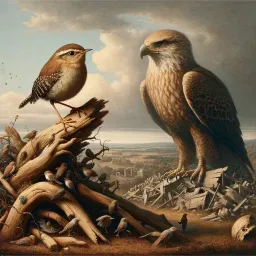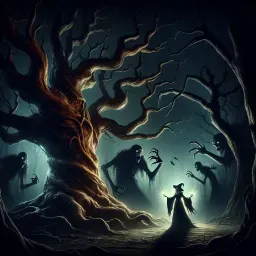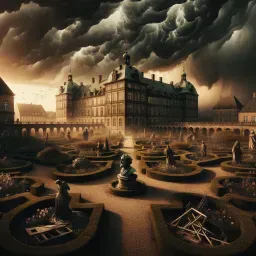I bear a charmed life

- Meaning
- The phrase "I bear a charmed life" means to live a life that is evidently protected from the hardships and dangers that afflict most people. In this context, Macbeth believes he is invincible due to the witches' prophecy, which leads him to this false sense of security.
- Allegory
- The medieval knight in shining armor represents Macbeth, confidently striding through perilous situations believing himself protected by fate. The arrows and swords missing him reflect the supernatural protection he feels he has, while the serene determination on his face showcases his unwavering belief in his invincibility. The dark, ominous sky in the background subtly serves as a foreshadowing of the turbulent fate that ultimately awaits him, contrasting with the immediate sense of mystical protection he enjoys.
- Applicability
- This phrase can be applied to personal life in recognizing or reflecting a belief or feeling of being protected or fortunate, almost as if by magic or fate. It might describe someone who navigates life's difficulties relatively unscathed or feels particularly blessed or lucky.
- Impact
- Shakespeare's work, including this phrase, has had an enduring impact on culture and literature. It reflects human themes of fate, hubris, and the notion of invincibility. This particular phrase is often cited to indicate someone who seems exceptionally fortunate or free from typical afflictions. It can be seen influencing literature, theater, and modern colloquial speech, often invoked in dramatization or descriptions of near-miraculous luck.
- Historical Context
- The historical context of "I bear a charmed life" lies within Elizabethan England during the late 16th century, a period known for its rich cultural zeal, especially in the realms of the arts and literature. Shakespeare wrote "Macbeth" around 1606, during the reign of King James I, an era marked by political intrigue, exploration of the supernatural, and questions about fate and destiny.
- Criticisms
- Criticisms or controversies regarding this phrase typically revolve around interpretations of Shakespeare's text and its deeper meanings. Some might argue that Macbeth's belief in his "charmed life" is representative of his tragic flaw — hubris — and thus, it's a critique of egotistical overconfidence rather than a true statement of fact.
- Variations
- Variations of this phrase might include fortuitous or blessed expressions in different cultures. For example, in modern terms, someone might say, “I seem to have a guardian angel" suggesting the same kind of supernatural protection or luck.
-

The empty vessel makes the loudest sound.
-

The world is grown so bad, that wrens make prey where eagles dare not perch.
-

By the pricking of my thumbs, something wicked this way comes.
-

If you can look into the seeds of time, and say which grain will grow and which will not, speak then to me.
-

A friend should bear his friend's infirmities, but Brutus makes mine greater than they are.
-

When we are born, we cry that we are come to this great stage of fools.
-

The evil that men do lives after them; the good is oft interred with their bones.
-

I will wear my heart upon my sleeve for daws to peck at.
-

O, had I but followed the arts!
-

Give me my robe, put on my crown; I have immortal longings in me.
-

Come what come may, time and the hour runs through the roughest day.
-

Something is rotten in the state of Denmark.
No Comments